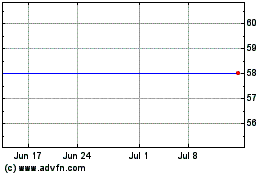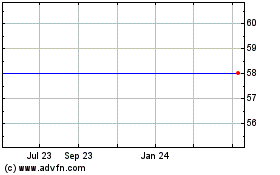Second Blow to AT&T/T-Mobile Merger - Analyst Blog
November 23 2011 - 5:45AM
Zacks
AT&T Inc.‘s (T) proposed $39 billion
purchase of Deutsche Telekom’s unit, T-Mobile USA, is facing
another setback following opposition from the Federal
Communications Commission (FCC).
Earlier in August, the Department of Justice blocked the
proposed merger and filed an antitrust lawsuit with the U.S.
District Court in Washington. The trial is expected to start on
February 13. Now, the FCC is seeking to send the proposal to the
administrative law judge for hearing, which is expected to start
after the completion of the trial.
According to the FCC, the combination of the second and fourth
wireless operators will create America’s largest mobile phone
company surpassing the present leader, Verizon Wireless, a joint
venture of Verizon Communications Inc. (VZ)
and Vodafone Group Plc (VOD). The deal could also
mellow down innovation and investments in the industry and
eventually affect customers.
Further, the proposed transaction would create a duopoly market
for the U.S. wireless industry apart from flaring up prices and
layoff issues. It would also stifle competition and make
AT&T and Verizon Wireless the only two dominant players in the
industry, controlling almost 80% of the U.S. wireless post-paid
market. Moreover, the FCC is not convinced with AT&T’s
assertion that the transaction would result in the faster rollout
of a high-speed 4G network.
The proposed AT&T/T-Mobile merger hearings remind us of the
DirecTV Inc. (DTV) and EchoStar
Corp. (SATS) merger trials that hit headlines almost a
decade ago. Finally, the EchoStar-DirecTV deal was called off.
The recent move by FCC has raised doubts about the consummation
of the AT&T/T-Mobile merger.
In fact, even the third-largest U.S. wireless carrier
Sprint Nextel Corp. (S) has opposed to this
merger. We see this as an obvious reaction as the combined company
would be almost three times that of Sprint.
Furthermore, the effects of the merger on smaller and lower-cost
wireless carriers like MetroPCS Communications
Inc. (PCS), United States Cellular
Corporation (USM) and Leap Wireless International
Inc. (LEAP) remain unclear. The combination might put
pressure on these carriers to purchase more spectrums for future
broadband networks. These companies will not be able to outbid
bigger competitors in spectrum auctions and business partnerships
as the merger would make deals and contracts more expensive.
AT&T seems disappointed by the FCC action. The telecom ace
was looking to close the deal in the first quarter of 2012.
While we await the final decision on this much-hyped merger, we
prefer to maintain our long-term Neutral recommendation on
AT&T. The company retains the Zacks # 3 (Hold) Rank for the
short term (1-3 months).
DIRECTV (DTV): Free Stock Analysis Report
LEAP WIRELESS (LEAP): Free Stock Analysis Report
METROPCS COMMUN (PCS): Free Stock Analysis Report
SPRINT NEXTEL (S): Free Stock Analysis Report
ECHOSTAR CORP (SATS): Free Stock Analysis Report
AT&T INC (T): Free Stock Analysis Report
US CELLULAR (USM): Free Stock Analysis Report
VODAFONE GP PLC (VOD): Free Stock Analysis Report
VERIZON COMM (VZ): Free Stock Analysis Report
Zacks Investment Research
DTE Energy (NYSE:DTV)
Historical Stock Chart
From Jun 2024 to Jul 2024

DTE Energy (NYSE:DTV)
Historical Stock Chart
From Jul 2023 to Jul 2024
